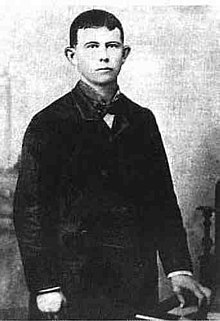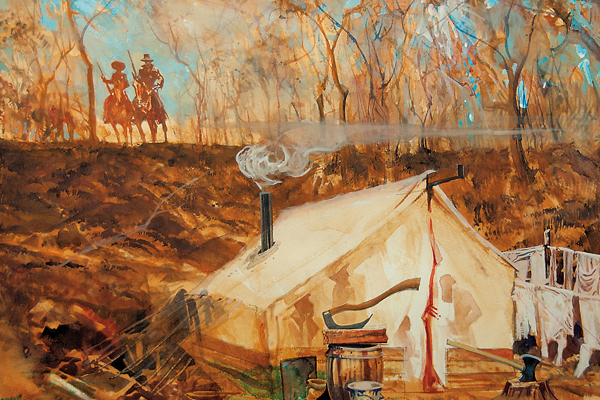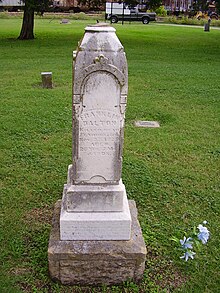
Frank Dalton
Born into the family of deadbeat saloon keeper, race horse gambler, and fiddle player James Lewis Dalton Jr. and farm girl Adeline Lee Younger (she is 15 when the couple marries in Independence, Missouri in 1851, the groom is 36 ... she is also the aunt of the Civil War guerrillas and Wild West desperadoes, Jesse and Frank James' riding partners, Jim, John, Bob, and Cole Younger) on June 8, 1859 in Westpoint, Missouri, Franklin "Frank" Dalton is the fourth sibling in what will become a clan of twelve children (nine boys and three girls, with an additional three children lost in their infancy ... four of the boys will become outlaws, Grat, Bill, Bob, and Emmett). Growing up surrounded by the violence of the Civil War and a father that is often missing, or drunk when he is around, Frank's formal education ends when he is only nine and goes to work for a series of local stables to help with the family finances. Good with horses and other farm animals, the young man also becomes a feared fighter, is said to be able to cuss better than an man in the county, learns tracking skills, and along with his brothers, plinking away at empty bottles balanced on fence posts, turns into a crack shot with either a pistol or a rifle. Tall and lean, a respected and serious young man by the time he becomes an adult, in 1882, Frank, along with his younger brother Grat, finds an occupation that marries well with his particular set of skills and becomes a Cherokee Light Horseman, a riding policeman working for lawman John W. Jordan (it is believed that both boys are part Cherokee on their mother's side).

Adeline

Grat Dalton
A success at a trade infamous for the sudden and violent deaths of many of its practitioners, in 1884, Frank is commissioned a U.S. Deputy Marshal riding for the court of "The Hanging Judge," Judge Isaac Charles Parker (in twenty-years on the federal bench, Parker will have 13,490 cases tried in his court and will sentence 160 men to death, 79 of which have their necks stretched) ... a rough job that requires hours in the saddle, pays only two dollars for every arrest (received months later), and makes the deputy marshal responsible for the burial expenses of any criminal killed while an arrest is being made (of the two hundred and twenty-men that will try to keep the peace in the Indian Territory, sixty-five will die in the field with their boots on), Dalton's new occupation does come with the perk of allowing each lawman to a posseman for assistance with arrests and transportation of prisoners. Frank of course picks his younger brother Grat to be his official helper, and Bob is often given sundry camp duties too. Manhunts, knuckle brawls, arrests, and gunplay, honesty and courage often on display, for three years Frank takes on the criminal scum and riff-raff flowing into the territory, and by 1887, he is one of Parker's favorite officers ... an honor that will soon get Dalton killed.

Parker
Fort Smith Courthouse
Bob Dalton And His Girlfriend, Florence Quick
Embarrassed that a group of crooks has openly set up camp just outside of his headquarters across the Arkansas River, when Frank Dalton arrives in Fort Smith in November to turn in six prisoners, Judge Parker gives him, and U.S. Deputy Marshal Jim Cole, the task of ousting the miscreants, led by outlaw Dave Smith. Believing he will have no problems with bringing in Smith, Frank lets his brother Bob and fellow posseman Bud Healy sleep, and on a cold Sunday morning, he and Cole ride off to arrest Smith at a nearby campground called Payne's Clearing (the former wood chopping area is now a part of Sequoyay County, Oklahoma). Arriving at the location, that features a west facing tent cabin made of canvas and logs (inside are Smith, Smith's brother-in-law, Lee Dixon, Dixon's wife, and outlaw William Towerly), the lawmen dismount about thirty feet from the back of the structure, grab their Winchesters, and close on hideouts front tent flap. As if he had poked a hornet's nest, sticking the barrel of his rifle through the flap, Cole is immediately confronted by Dixon's wife, who tries to tear the lawman's weapon away, and Smith, holding a Winchester at the ready. Seeing Cole is occupied, Smith aims his weapon at Dalton, who exclaims, "Hold up! Hold up! We don't want any trouble here." In response, Smith shoots Dalton in the chest at point blank range before turning his gun on Cole. Heartbeat lifetimes, Cole rips his rifle out of Mrs. Dixon's hands, firing a shot in the air, staggers backwards, tripping over a tent wire, and is wounded in the chest by a bullet from Smith, who then turns towards where Dalton has fallen, thinking Cole has been dealt with, and fires another slug at the wounded lawman. A mistake turning his attention away from an opponent, Cole takes aim and sends a rifle round into that drops Smith face first in the mud.

Approaching The Death Tent - True West Illustration
Newspaper Illustration
For his sharp shooting taking out Smith, Cole is rewarded by being fired on and wounded again from someone firing a pistol from within the tent. Retreating to a better spot to cover the tent's entrance from behind a protective pine (passing Dalton as he backs away, Cole asks the lawman if he is okay and receives no reply), for a few moments Cole duels the occupants of the structure (tree hit too close for comfort, Cole moves to another tree with a larger trunk) and is pleased when following one of his shots, he hears a voice scream, "Lord a mercy, I'm killed (it is Mrs. Dixon), and after another, drops Dixon himself as the outlaw tries to grab Smith's fallen rifle (struck in the left collarbone, Dixon will later be taken to Fort Smith, where he dies in a nearby hospital later that day). Fire accurately returned from the last occupant of the tent, when Cole runs out of bullets (extra ammo was with the lawmen's horses which ran off with the sound of the first gun's report), thinking his partner is dead, the lawman makes a tree dash out of the area and heads back to Fort Smith for help. For a few seconds there is quiet in the area, then gunman William Towerly cautiously makes his way out of the tent.
Winchester 1885
Unshaven and unwashed, morning ruined by the law's arrival, 19-year-old hardcase Towerly improves his armament by retrieving the Winchester Dalton had dropped when he was shot. Checking the area for more enemies, the teenage outlaw discovers the wounded Dalton behind the cover of a tree stump at the back of the tent. Acknowledging his submission, Dalton raises his hands over his head, and pleads, "For God's sake, don't shoot. I'm already a dead man." A plea in vain, without saying a word, Towerly stills the lawman for good by shooting him in the face with his own weapon, then just to be sure, the outlaw puts the gun to Dalton's forehead and puts another slug into the already dead deputy marshal's head. Killing over, Towerly then grabs a handful of supplies, saddles Smith's horse, and rides out of the area. $1000 reward placed on the youth's head for the killing of Dalton, Towerly has less than a month to live.
Word received that Towerly might be hiding out near his father's home, in the Stringtown area to the northwest of the town of Atoka, at the boardinghouse of a Mrs. McKianey, U.S. Deputy Marshal Heck Thomas orders deputies William A. Moody and Ed Stokley to bring the outlaw in (the men at the time are part of a posse bringing 40 men back to Fort Smith for judgment) ... dead or alive. Arriving at the well built two-story structure with a covered front porch that serves the area's travelers after a long train journey then ride through a freezing rain, on Saturday, December 4, 1887, the two men dismount at the front porch of the building and call out for Towerly to come outside and surrender. A moment later the front door explodes open and Towerly, holding a rifle he swings wildly from targeted lawman to targeted lawman, confronts the lawmen. Trying to talk the fugitive into surrendering, Stokley believes he has accomplished that goal when the outlaw looks down, shaking his head of what has led to the arrest request and lets the barrel of his rifle dip. It is a fatal mistake. Taking a step forward and reaching gently for the outlaw's weapon with his left hand, Towerly instead pulls the rifle up in a flash and sends a slug from point blank range into Stockley's chest. Reflex reaction to his death, Stokley gets off a single shot before crumpling to the ground ... a single shot that hits Towerly in the right leg. Slammed into the door frame of the building by the shot, before Towerly can right himself, Moody empties his rifle into the outlaw. Mortal wounds aplenty, the teenage killer has just enough time to say he is sorry, admit to killing Frank Dalton, and to state his motive for murdering the lawman ... he thought he was doing him a favor by putting him out of his misery.
Heck Thomas
As for Frank Dalton and his family, the dead lawmen, accompanied by his brother Bob and Bud Healy, makes his final journey home (he is living on the family farm with his mother) by way of train, buggy, and then the hands of family and friends, before being buried at the Elmwood Cemetery in Coffeyville, Kansas. Frank's death an opening for advancement, Grat moves up and into his older brother's position, Bob becomes Grat's assistant, and Emmett leaves his cowboying days working for the Bar-X-Bar Ranch (during his stay there, he will ride with future fellow outlaws, Bill Doolin, Dick Broadwell, Bill Powers, Charlie Pierce, George "Bittercreek" Newcomb, and "Blackface Charley" Byrant) and becomes a prisoner guard for his brothers. A moment made for a vow of vengeance against all outlaws, the brothers, without their older brother's guidance, instead become criminals themselves. Using grievances about slow reward payments, the Daltons start making a little extra cash by fudging evidence and taking bribes from whiskey traders, and then becoming horse rustlers (there are also rumors that Bob has killed a rival over the affections of a local girl). Drummed out of the marshal service and then ordered arrested by Judge Parker, they then decide as long as they are being treated like outlaws, they ought to become real bandits. Notorious in the Indian Territory already, under the leadership of Bob, the brothers and their companions begin a two year reign of terror that includes robbing a gaming house in Silver City, New Mexico, train robbery in California (visiting their brother Bill, they ruin his political career and the state and he will soon be a bandit too), a train job at the town of Wharton, taking a Katy flier at the community of Leliaetta, the robbery of a train at Red Rock, and engaging in a night gun battle with authorities that kills two innocent civilians and wounds two lawmen as they rob a train at Adair, Oklahoma, before the gang has it's outlaw Waterloo trying to rob two banks at the same time on October 5, 1892 in Coffeyville, Kansas (Bob is seeking retirement funds to move to mexico, and ego on display, wants to do something the James boys and the Youngers were never able to pull off).

Frank's Gravesite

Bob And Grat - Coffeyville, Kansas

Wounded Prisoner Emmett
No comments:
Post a Comment